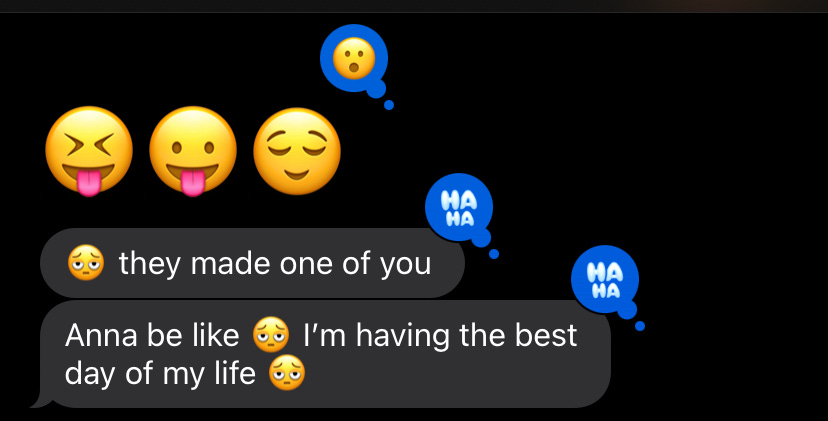A year ago when I first got the idea for a newsletter, the name came first: "Emotional Erosion." But what did it really mean? What would I write about? I didn't yet know (and maybe don't even know right now!), but the alliteration was exciting to me. Naming a thing is always the most fun part, in my opinion. I tend to see myself as an emotional person (aren't we all?), but those emotions are not always apparent to those who don't know me well. Even those who do know me well can be perplexed by me, taken off guard when they discover how I'm really feeling. My partner (lovingly) refers to my resting face as "Garfield eyes," invoking the half closed lids of that lovable cat that hates Mondays and loves lasagna. My parents have often told me that I'm very "serious" and are surprised that my partner makes me laugh so much, not for lack of humor, but because they seem to think that I never laugh out loud.
I don't know if the allegations of seriousness will be dropped as you read on. I guess, like so many people on this platform, I'm wanting to write to be better understood, by both myself and others. When you first log on to Substack you're prompted to make a “welcome" post. We are constantly introducing and reintroducing ourselves in this world, so consider this to be my welcome post as of now.
This past week I finished listening to The Science of Murder by Carla Valentine on audio. I do most of my audiobook listening while cooking, cleaning, or crafting, and this one was consumed primarily while cooking (which got a little gross when hearing about the detritus that can be found in earwax that may provide clues to a person's profession or hobbies). The book discusses the real science behind classic mystery writer Agatha Christie's novels and even reveals some areas where Christie's writing preceded the science and methods used in criminal investigations. I (most likely) learned about this book from listening to the podcast Shedunnit, hosted by Caroline Crampton. There was a recent point in my life where I was convinced that the main genre that held my attention was murder mysteries, so a podcast discussing the great female murder mystery writers piqued my attention (go figure!). After a few years I started to feel burnt out on the mystery genre. I felt like everything I read was the same, even if it had been deemed a classic; even if it was written by authors that I previously loved. Mystery has taken a back seat in my reading life, but on a whim I checked out Science of Murder from the library, and in a wholly unexpected way, it's reconnected me with my original intentions when first dreaming up this newsletter.
This past week was also spent thinking about the fourth week of The Artist's Way by Julia Cameron. For those unfamiliar, this week of Cameron's 12 week program is all about reading deprivation. And, no, not warning against the perils of reading deprivation, but rather encouraging it to hopefully induce some deeper creative state once you are driven to madness by being alone with your own thoughts for far too long. I'm a recurring drop-out of the program, and this week is usually the culprit. But this time around, through the help of Chelsey Pippin Mizzi's Tarot Artist's Way, this once treacherous week was a huge success. And all because I allowed myself to read as much as I wanted, as long as I was being mindful of what I was taking in. Throughout the week, I saved a running list of media I was consuming in the notes app on my phone, anything from books and articles to Instagram posts and memes. And after the week was done, I set aside about 20 minutes to skim through what I saved and note what picture was being created, what story was being told.
Some people use what's called a "second brain" for this type of media archiving. I've attempted to use one but have come to the conclusion that I need to get a handle on my first brain first. With the second brain method, I found myself saving a ton of links to articles in hopes of getting to them someday. Or saving endless books to a TBR list just to have them pile up and be forgotten, with me not even knowing why I had put them on the list in the first place. It was in the hope that I would have it all if I needed it "someday." For me, that method of saving things meant that someday would never come. I would spend all my time categorizing and hoarding interesting things just to end up being exhausted by the thing that should be most exciting: reading the things; consuming the things; enjoying the things. I was like a squirrel that had stored away a huge stockpile of nuts, only to forget where I had saved them, or that I had saved them at all. Too much time in my life has been wasted waiting for that "someday."
One concept discussed in Science of Murder is Locard's exchange principle, which states that a criminal will leave something at the scene of a crime and also leave with something from it. They will both affect and be effected, change and be changed. I think this principle applies to all humans, regardless of our criminal status. We are constantly picking up and leaving detritus (sometimes even in our earwax), and it's up to each individual to decide how and when they take note of these comings and goings. For me, I accept that I can't know every instance where I have affected and been effected1, but I can decide to consciously notice.
In Lord Edgware Dies, the infamous Detective Hercule Poirot is clashing with his more traditional-leaning counterpart Captain Arthur Hastings. Poirot says,
You wish me to measure footprints, to analyze cigarette ash, to prostrate myself on my stomach for the examination of detail. You never realized that by lying back in an armchair with the eyes closed, one can come nearer to the solution of any problem. One sees then with the eyes of the mind.
The writings found in this newsletter will never be from an traditionalist telling you how I intricately plotted the outline of my essay or meticulously researched. It's coming from a person trying to celebrate the life I have laid out before me, trying to enjoy what the world has to offer. I aim to be the Hercule Poirot of noticing, and noticing that I can only do so after lying back and seeing with the eyes of the mind.
I made the bold choice of using affect and effect, homonyms that often confuse me in their differences. I even tried to look up the difference and still felt confused. Please allow me some artistic freedom if my usage is not correct! I am a human being!




